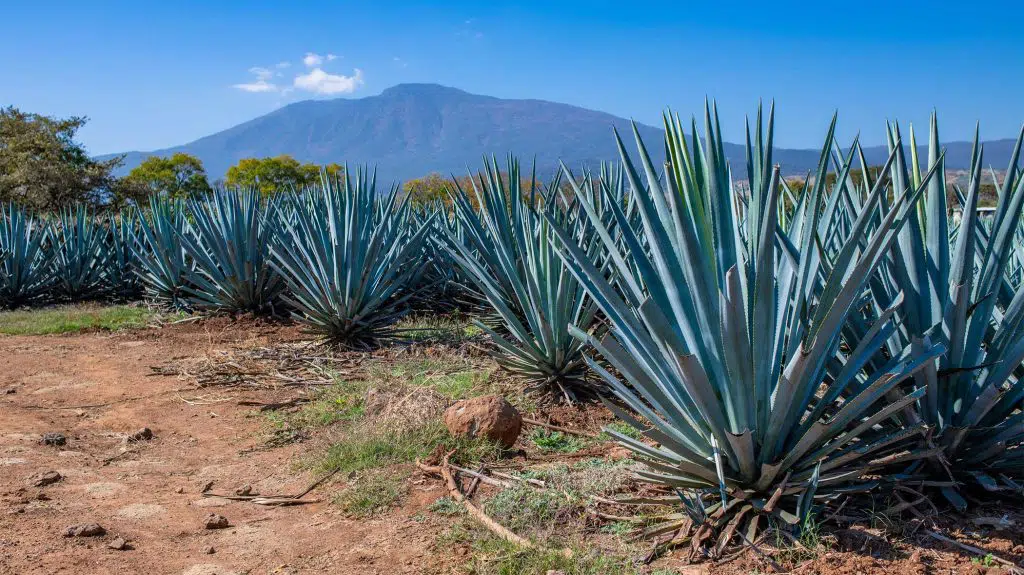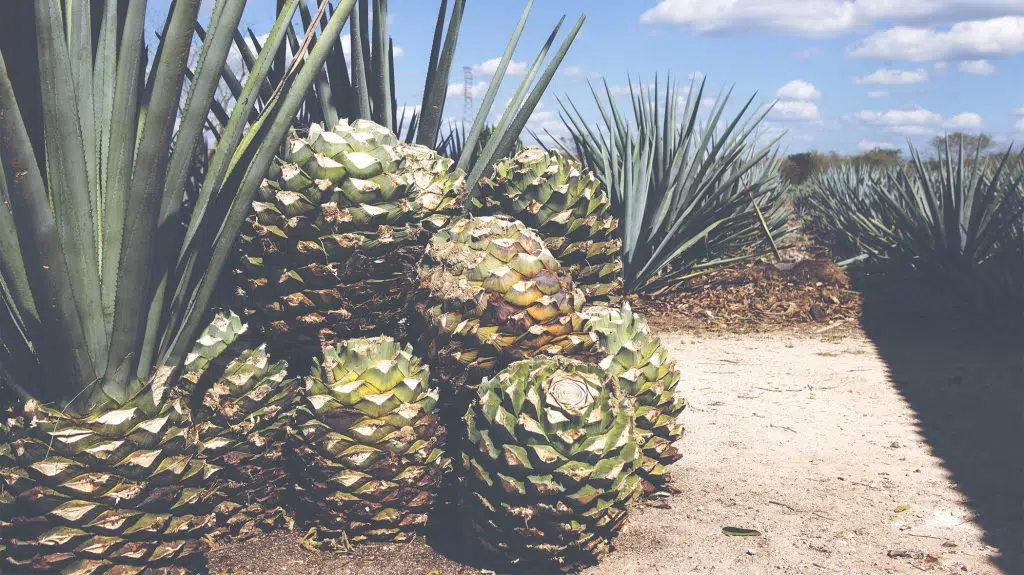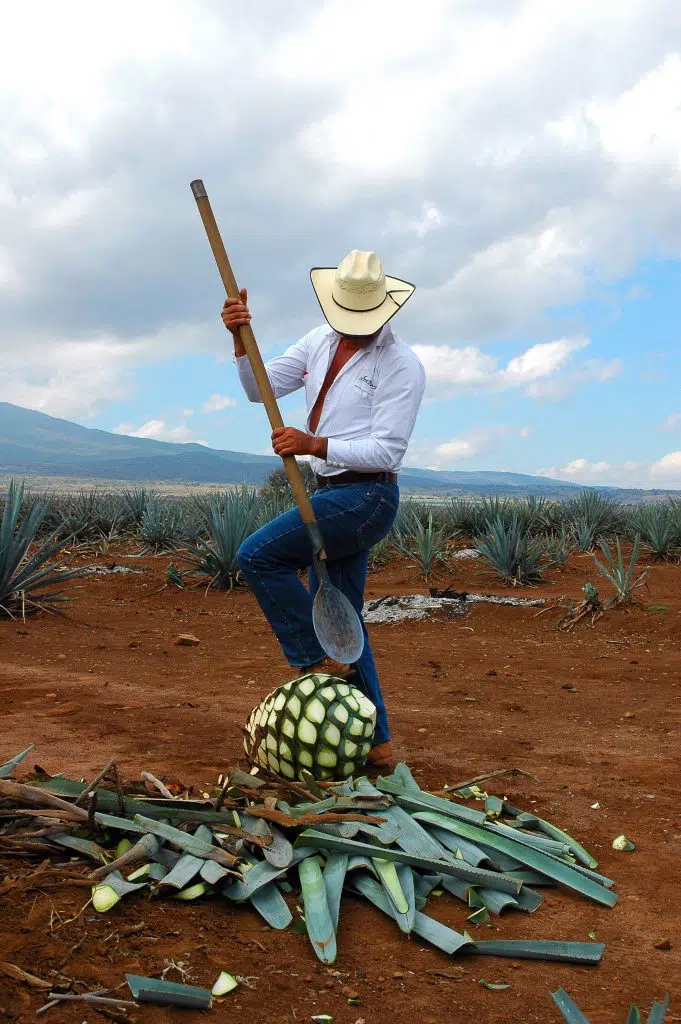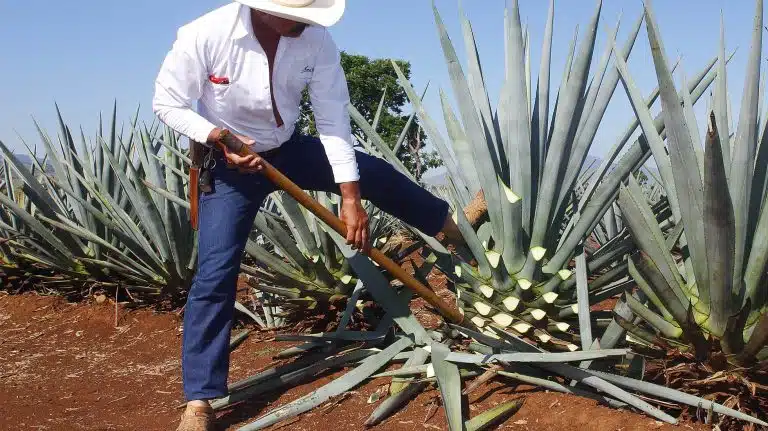Tequila is a distilled spirit made from the blue agave plant. High-quality tequilas have distilled blue agave as their only ingredient, while other tequilas known as mixtos mix fermented agave juice with spirits made from sugar juice.
Tequila can only be made in specific places in Mexico. The blue agave plant, or agave tequilana in Spanish, is native to the region. The Mexican government and a tequila regulatory council (known as the CRT) also have laws that protect tequila as an exclusively Mexican product.
Tequila is a popular spirit in many parts of the world. It comes in well-known brands like Jose Cuervo, Patrón, Sauza, and is enjoyed plain or in cocktails like margaritas. Tequila has a high alcohol content of about 50%, which can hurt your health if you’re not careful.
Tequila Ingredients
The process of making tequila is complex, but only a few ingredients end up in the bottle. Some tequilas don’t have any ingredients other than agave. Main ingredients you will find in many tequilas include:
- distilled blue agave (main ingredient in all tequilas)
- sugars
- additives (give some types of tequila different colors)
Pure agave tequila is often seen as higher-quality and better tasting than mixto tequila.
Tequila Production
The traditional method of making tequila is a strenuous process that doesn’t involve machinery.
Modern tequila is made with more advanced techniques and technology, though some brands still use more traditional methods. There are debates among tequila drinkers whether modern methods make better tequila than traditional ones.
Tequila and mezcal are both Mexican spirits harvested from the agave plant, but their production is much different, leading to different flavors and strengths.
Growing & Harvesting
Growing and harvesting the agave tequilana is one of the most crucial parts of tequila production. The blue agave plant is a succulent that takes at least six years to mature.
The agave tequilana grows in many parts of the Americas, but tequila can only be produced in the Mexican state of Jalisco and small parts of the states Guanajuanto, Michoacan, Tamaulipas, and Nayarit.

Harvesters known as jimadores focus on harvesting the agave piña, or heart. The piña has starches that will be made into tequila via a thorough process.


Cooking
Cooking agave hearts in traditional brick ovens (known as hornos) or steam ovens (known as autoclaves) turns their starches into fermentable sugars. Cooking agave in hornos takes over 24 hours, while cooking in autoclaves takes about 7 hours.
After the hearts are cooked, they are crushed, pressed, or shredded to release the juices inside. Modern distillers use a diffuser that gets fermentable sugars from agaves without cooking them. Traditional distillers use a large stone known as a tahona to crush the agaves.
This juice is either put into tanks or left in the open to start fermentation.
Fermentation
Traditionally, fermenting blue agave juice involved simply leaving the juice out in the open to ferment. Today, distilleries use fermentation tanks to make fermented agave liquid using yeast.
Fermenting agave juice can take more than a week. By the time fermenting is done, the agave liquid has a low alcohol content of about 6%.
Distillation
Modern distilling of tequila includes passing fermented agave juice through stills, or metal chambers that extract ethanol from fermented juice. Two types of stills, known as pot stills and column stills, may be used by the distiller.
Tequila is distilled two times. The first distillation is known as ordinario, which increases the alcohol content of the liquid to around 20%. The second distillation is known as rectification, where the finished product has a much higher alcohol content.
At this point, the tequila can be bottled and sold as blanco tequila, or aged further.
Aging
Some tequilas are aged in barrels after they are distilled. Whether a tequila is aged or not, and the methods the distillery uses to age it, can change how tequila is categorized. Different forms of aged tequila include:
- silver or blanco tequila: not aged or aged for less than two months in barrels
- gold tequila: usually not aged, either a blend of tequila types or colored with additives
- reposado tequila: aged between 2 to 12 months in oak barrels or pipones (vats)
- añejo tequila: aged between 1 to 3 years in oak casks
- extra añejo: aged for at least 3 years in oak casks
Aging tequilas can give them smokier or sweeter flavors.
Bottling & Consumption
Pure agave tequila can only be bottled in specified areas. Whether tequila is pure or mixto, it is known for its unique taste and high alcohol content.
Tequila is a popular drink served at parties, bars, or when drinking alone. Drinking too much tequila can cause health problems in both the short- and long term. To find out if your tequila drinking habits can be harmful to your health, contact our helpline today.
Tequila FAQs
How Much Alcohol Is In Tequila?
Tequila sold in the U.S. is around 40% alcohol, which is relatively high. A 1.5 ounce shot of tequila counts as one standard drink. Tequilas with higher alcohol contents are often sold at higher prices than normal tequila.
Learn more about Tequila Alcohol Content
Does Tequila Have Any Health Benefits?
Some people claim that tequila has a variety of health benefits, such as improved digestion, stronger bones, and reduced risk of type 2 diabetes.
However, none of these health benefits have been linked to drinking tequila. Instead, they’ve only been linked to consuming the raw agave plant that tequila comes from.
In addition, even if tequila did have health benefits, they would not outweigh the drink’s health risks.
To learn more, read Is Tequila Good For You?
What Does Tequila Taste Like?
Tequila is made from the blue agave plant. Its taste depends on where the agave is harvested and how long it is aged. Tequila that is bottled immediately after it is distilled has a citrus but harsher flavor than other varieties.
Aged varieties, like reposado, anejo, and extra anejo, have an earthy taste and smoother texture. Aged styles also tend to take on sweeter notes as well, such as honey, caramel, banana, and chocolate.
To learn more, read What Does Tequila Taste Like?
Is Tequila A Depressant?
Yes, tequila is a depressant. Even though some report feeling energetic after drinking tequila, all alcoholic drinks are central nervous system depressants.
To learn more, read Is Tequila A Depressant?
How Many Shots Of Tequila Does It Take To Get Drunk?
It takes an average of 2 to 3 shots of tequila to get legally drunk. The number of shots it takes to feel intoxicated depends on factors like body weight, genetics, and drinking on an empty stomach.
Learn more about Taking Shots Of Tequila To Get Drunk
What Causes A Tequila Hangover?
A tequila hangover occurs when someone drinks too much in a short period of time. Alcohol contains toxic chemical compounds that can contribute to hangover symptoms. These compounds, called congeners, are produced during the alcohol fermentation process.
In addition, drinking too much alcohol can lead to dehydration, low blood sugar, and irritation in your stomach. This can lead to a wide range of symptoms that vary in severity and impact daily functioning.
Learn more about Tequila Hangovers
Do Underage Teens Drink Tequila?
Sometimes. According to a 2019 study of high school students, 29% drank alcohol, and tequila is among the most popular types of alcohol.
Underage drinking poses a variety of risks, including alcohol poisoning and alcohol use disorder. To prevent your teen from using tequila or other types of alcohol, discuss the dangers of alcohol, stay involved in your child’s life, and model positive behavior by drinking only in moderation.
Learn more about Drinking Tequila Underage
What Is The Difference Between Vodka & Tequila?
Vodka and tequila are both distilled spirits. However, tequila offers a few health advantages over vodka. While vodka is colorless and naturally gluten-free, tequila is a healthier drink that’s low in sugar, carbohydrates, and calories.
In addition to this, vodka originated in Russia and Poland while tequila originated in Mexico. Tequila is made from the agave plant while vodka is produced with grains and potatoes.
Learn more about Tequila Vs. Vodka
Written by Ark Behavioral Health Editorial Team
©2024 Ark National Holdings, LLC. | All Rights Reserved.
This page does not provide medical advice.
Decanter - Learn about Tequila: Everything you need to know
Electronic Code of Federal Regulations - Electronic Code of Federal Regulations (eCFR)
Fine Cooking - Tequila Terminology
VinePair - The Difference Between Pot Versus Column Stills, Explained

Questions About Treatment?
Ark Behavioral Health offers 100% confidential substance abuse assessment and treatment placement tailored to your individual needs. Achieve long-term recovery.
100% confidential. We respect your privacy.
Prefer Texting?
Our friendly support team is here to chat 24/7. Opt out any time.








 Learn More
Learn More








